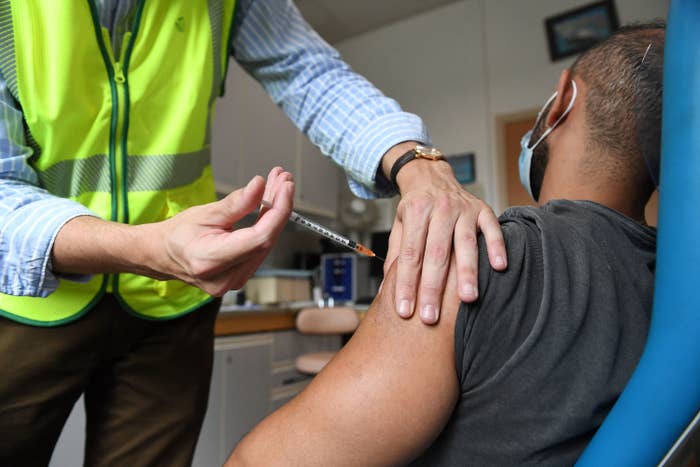
Men who have sex with men should “for the moment” reduce partners and reconsider sleeping with new people in order to try to halt the global spread of monkeypox, the head of the World Health Organization said Wednesday.
WHO Director-General Tedros Adhanom Ghebreyesus told reporters at a press conference in Geneva that 98% of the more than 18,000 recent monkeypox cases reported to the agency had been among men who sleep with other men. He urged members of this community to take steps to protect themselves amid the public health emergency.
“This is an outbreak that can be stopped if countries, communities, and individuals inform themselves, take the risks seriously, and take the steps needed to stop transmission and protect vulnerable groups,” Tedros said.
“For men who have sex with men, this includes, for the moment, reducing your number of sexual partners, reconsidering sex with new partners, and exchanging contact details with any new partners to enable follow-up if needed,” he advised.
These men might also consider avoiding big circuit parties or shirtless raves for the time being; Rosamund Lewis, technical lead for monkeypox at the WHO Health Emergencies Program, advised these men to reduce “the exposure in places that may put you at risk, such as crowded settings where lots of physical contact may take place among people who may already be at risk.”
Wednesday’s new WHO advice goes beyond what has been suggested by the CDC in the US, which has so far only said that men who have sex with men should avoid skin contact with a person who has a rash that might be monkeypox.
The guidance also comes amid outcry from many in the LGBTQ community at a lack of clear messaging from health authorities and at a botched response from the federal government.
Andy Seale, a WHO adviser on sexually transmitted infections, said the advice on reduced sex was “one message in a package of prevention messages that needs to get through to people.”
People — and particularly men who have sex with men — are also being urged to continue to learn about the virus, monitor themselves or others for symptoms, and to seek medical attention as needed, Seale said.
Monkeypox cases have spread to 78 countries, per the WHO, but only five deaths have been reported. About 10% of those people infected have been admitted to a hospital to manage their extreme pain.
Lewis said the WHO was attempting to walk a fine line in trying to make clear that while anyone can get monkeypox, it is currently men who sleep with men who are predominantly affected.
“It is a very difficult message to put across,” Lewis said.
The “key mode of transmission” for the virus so far has been the “close, intimate, personal, prolonged contact that happens during sex,” Seale said, but there have also been a few cases of household transmission.
The WHO convened sexually transmitted infection experts to discuss classifying monkeypox as an STI, but Seale said this panel was not yet comfortable in doing so.
“They’ve concluded this is clearly transmitted during sex, so they’re comfortable in describing this as sexually transmittable, but they have not yet felt able to reach a conclusion that this is an STI,” he said.
The US Food and Drug Administration announced Wednesday it had cleared the way for almost 800,000 additional doses of the monkeypox vaccine to be distributed in the US after they officially certified a Danish manufacturing facility.
US Secretary of Health and Human Services Xavier Becerra described the FDA’s action as “a critical step forward in our plans to strengthen and accelerate our monkeypox response, which includes distributing a safe and effective vaccine to those at highest risk of exposure to monkeypox.”
The Biden administration has been accused of being too cautious and slow in its response to the outbreak, which was formally classified as a global public health emergency on Saturday by the WHO.
Both Tedros and Lewis warned that men who have had one shot of the vaccine must continue to exercise caution and not assume they have “instant protection.”
“The vaccine takes several weeks to take effect and produce an immune response,” Lewis said, “which means someone who is being vaccinated against monkeypox also has to continue taking protective measures and making safer choices during the time after the vaccine has been administered.”
The company that manufactures the Jynneos vaccine, the monkeypox vaccine most commonly distributed in the US, says it requires two doses for complete protection, but cities like New York, San Francisco, and Washington, DC, are adopting a one-dose strategy for now to try to get as many shots in arms as possible while vaccine supply remains limited.
